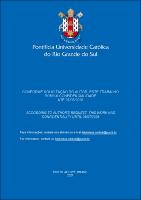| Share record |


|
Please use this identifier to cite or link to this item:
https://tede2.pucrs.br/tede2/handle/tede/9597| Document type: | Dissertação |
| Title: | Gestão judiciária e técnicas do processo agregado : aportes para aprimoramento da tutela jurisdicional coletiva |
| Author: | Alff, Hannah Pereira  |
| Advisor: | Osna, Gustavo |
| First advisor-co: | Jobim, Marco Félix |
| Abstract (native): | O presente trabalho objetiva analisar de que forma o Poder Judiciário pode melhorar a gestão judiciária em relação à eficiência e efetividade da tutela jurisdicional coletiva por meio de aplicação de técnicas do processo agregado. Utiliza de método sistêmico com pesquisa bibliográfico-documental. Parte da premissa de que o sistema processual moderno enfrenta uma crise, de modo que encontra dificuldades em realizar prestação jurisdicional isonômica, eficiente, efetiva e em tempo razoável. Supondo-se que a gestão judiciária pode ser instrumento alternativo apto para a solução da crise com a implementação de melhor administração judiciária e incentivo à visão pamprocessualista, investiga de que forma ocorreu a sedimentação de atividades de gerenciamento em ordenamentos jurídicos estrangeiros, trazendo a perspectiva dos Estados Unidos da América e de Portugal. Para análise do plano processual coletivo – em perspectiva histórica e de aplicação contemporânea – e da agregação de direitos como técnica de gestão, incluem-se aos países anteriormente citados mais a Inglaterra e a Alemanha. Assim, a agregação de direitos é tratada como possibilidade de resolução de conflitos e traz, inicialmente, aportes sobre a aggregate litigation e multidistrict litigation. Em solo brasileiro, trata da questão da cooperação nacional e sua imprescindibilidade para fluidez processual coletiva, ainda mais em relação a concertação de atos, que traz como exemplos a coletivização da prova e a centralização de processos repetitivos como técnicas paradigmas de agregação. Conclui que ainda há obstáculos a serem superados, como o desafio da representação adequada. No entanto, é possível que se busque cada vez mais a melhora na prestação jurisdicional coletiva pela utilização de mecanismos de gestão balizados em instrumentais da economia e pela aplicação de técnicas do processo agregado, desde que integrados por meio da ótica pamprocessualista e pelo modelo colaborativo de processo. |
| Abstract (english): | This paper aims to analyze how the Judiciary can improve judicial management in relation to the efficiency and effectiveness of collective jurisdictional protection through the application of aggregated process techniques. It uses a systemic method with bibliographic and documentary research. It starts from the premise that the modern procedural system faces a crisis, so that it finds it difficult to carry out isonomic, efficient, effective and reasonable judicial provision. Assuming that judicial management can be an alternative instrument capable of solving the crisis with the implementation of better judicial administration and encouraging the panprocessualist perspective, it investigates how the sedimentation of management activities in foreign legal systems occurred, bringing the perspective of United States of America and Portugal. For the analysis of the collective procedural plan – from a historical perspective and of contemporary application – and of the aggregation of rights as a management technique, the countries previously mentioned plus England and Germany are included. Thus, the aggregation of rights is treated as a possibility of conflict resolution and this paper brings initially contributions about aggregate litigation and multidistrict litigation. On Brazilian soil, it deals with the issue of national cooperation and its indispensability for collective procedural fluidity, even more in relation to concerted acts, which brings as examples the collectivization of evidence and the centralization of repetitive processes as techniques of aggregation paradigms. It concludes that there are still obstacles to be overcome, such as the challenge of adequacy of representation. However, it is possible that the improvement in collective jurisdictional provision is increasingly sought by the use of management mechanisms based on economic instruments and by the application of aggregated process techniques, provided that they are integrated through the panprocessualist perspective and the collaborative model of process. |
| Keywords: | Gestão judiciária Processo coletivo Processo agregado Cooperação nacional Pamprocessualismo Judicial management Collective process Aggregate litigation National cooperation Panprocessualism |
| CNPQ Knowledge Areas: | CIENCIAS SOCIAIS APLICADAS::DIREITO |
| Language: | por |
| Country: | Brasil |
| Publisher: | Pontifícia Universidade Católica do Rio Grande do Sul |
| Institution Acronym: | PUCRS |
| Department: | Escola de Direito |
| Program: | Programa de Pós-Graduação em Direito |
| Access type: | Acesso Aberto |
| Fulltext access restriction: | Trabalho será publicado como artigo ou livro |
| Time to release fulltext: | 60 meses |
| Date to release fulltext: | 07/05/2026 |
| URI: | http://tede2.pucrs.br/tede2/handle/tede/9597 |
| Issue Date: | 22-Feb-2021 |
| Appears in Collections: | Programa de Pós-Graduação em Direito |
Files in This Item:
| File | Description | Size | Format | |
|---|---|---|---|---|
| DIS_HANNAH_PEREIRA_ALFF_CONFIDENCIAL.PDF | HANNAH_PEREIRA_ALFF_DIS | 468.31 kB | Adobe PDF |  Download/Open Preview |
Items in DSpace are protected by copyright, with all rights reserved, unless otherwise indicated.




